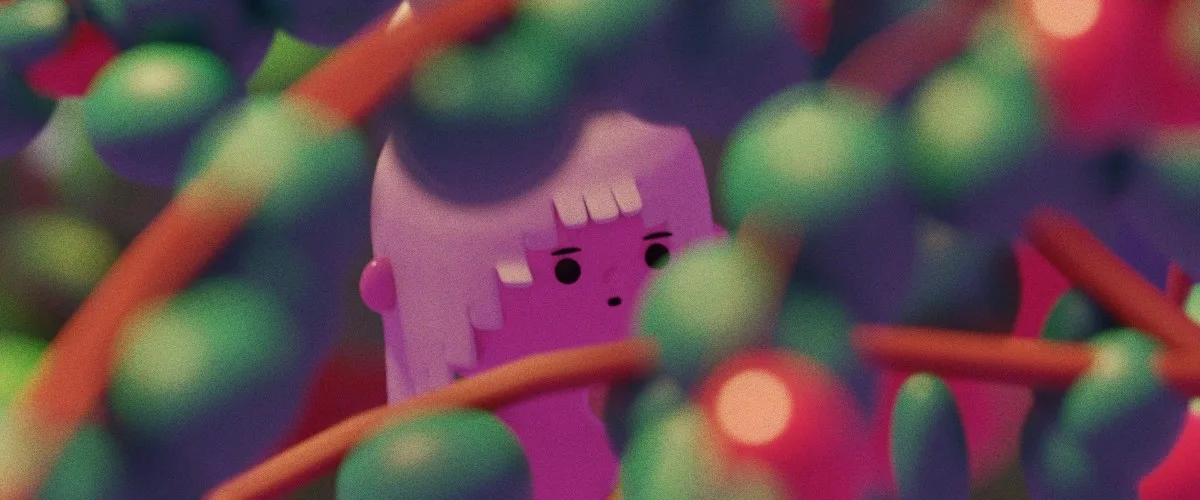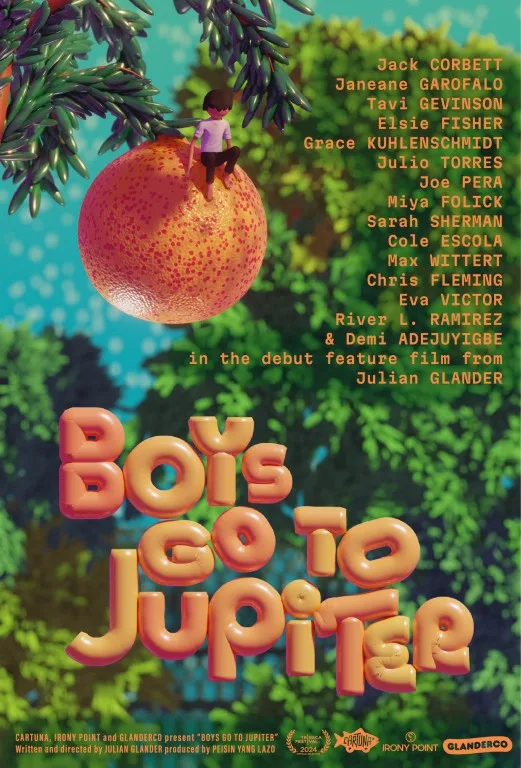Overflowing with imagination, “Boys Go to Jupiter” is an animated film about four lower-middle-class kids who suddenly find themselves interacting with adorably big-eyed, squeaky-voiced, gelatinous little creatures while still dealing with the tedious but necessary rituals of life. Written, directed, and produced by Julian Glander on a shoestring budget, it’s a candy-colored fantasy with musical interludes (the songs are all written by Glander, of course). The jumbled, faux-naive production design looks smooshed together from Playmobil and Fisher-Price playsets, Lego and Duplo blocks, elementary school art supplies, and childhood memories.
But at the same time, somewhat incredibly, “Boys Go to Jupiter” is also a portrait of young people stuck on the lower levels of the US economy, looking for ladders that were removed long ago. The main character is Billy 5000 (Jack Corbett), a bright, tough 16-year-old. When the story begins, Billy has dropped out of high school without telling either his absent mother or his older sister (“Sorry, Baby” director Eva Victor), who takes care of him. Sometimes Billy hangs around with his best friends: the lanky, redheaded goofball Freckles (Grace Kuhlenschmidt), Beatbox (Elsie Fisher), and the cute-as-a-button Peanut (J.R. Phillips), who seems to be five or six. But mostly, Bill skateboards all over town delivering food for an exploitative company called Grubster, which Beatbox mocks as “pizza delivery.”
“It’s not always pizza,” Billy says. “It’s a flexible delivery partnership. I get to be my own boss. I get mad tips. It’s tight.”
When Billy is asked the last time he slept, he replies, “Sleep is for rich people.” He hasn’t showered in weeks because, he says, “I don’t have the time. Here for the hustle.” He’s on a mission to save $5000, the amount he needs to move into an apartment and stop burdening his sister. He gets paid through an app that looks like a gambling app, and watches videos by a finance guru who insists that even a rigged system can be gamed. “Everything has a vibration, including money,” the guru promises. “I can show you how to channel those vibrations into beautiful income!”
The fantasy element comes into play when Billy delivers food to Dolphin Groves, a “family juice company” founded by Dr. Dolphin (Janeane Garofalo) that she assumes will be inherited by her daughter Rozario Dolphin (Myah Folick), a well-read, rebellious sort who prefers to be called Rozebud. Dr. Dolphin is a Willy Wonka of produce who leveraged an amazing early discovery into a greenhouse that breeds surreal strains of super-fruit, including a grapefruit-orange combo “designed for cocktails” and cube-shaped tangerines that are “easier to ship.”
In this world, everything and everyone has a price. Even the afterlife is quantified and appraised. When a hyper-religious customer of Billy’s becomes outraged by a local act of vandalism, she consults “The Sinner’s Handbook,” which informs her that the crime is punishable by “5 to 600 years of hellfire per letter.”
The movie is ultimately more of a clever, goodhearted, 90-minute riff than a fully satisfying work of art. There are places where the story succumbs to The Cutes (a condition typically treated with light doses of acid) as well as some promising avenues that are named or indicated but not explored. However, the filmmaker’s quiet confidence unites what might otherwise seem like a grab bag of bits.
And what wonderful bits! At its best, “Boys Go to Jupiter” has the bustling energy of those ensemble comedy-dramas about communities of oddballs that Robert Altman and Hal Ashby used to make, in which even minor characters are so exquisitely original they could be the lead of their own movie. My favorite here is the proprietor of a hot dog shack topped by a ridiculously huge hot dog sculpture who frets that his customers come for the sculpture, not the dogs. “The hot dogs we sell here, they’re good,” he says. “I’m not just saying that out of a point of personal pride. I’m saying that because I’m a hot dog guy. They might very well be the best in town. But no one seems to care.”
The storylines about family succession in the produce factory and working-class kids stuck in a gig-oriented economy eventually overlap, with more impact than you might have expected. The finale is a moral test that has real weight even though it’s played with a light touch. If there’s a message in “Boys Go to Jupiter,” it is that even when money has totally colonized life, some things remain priceless.




















